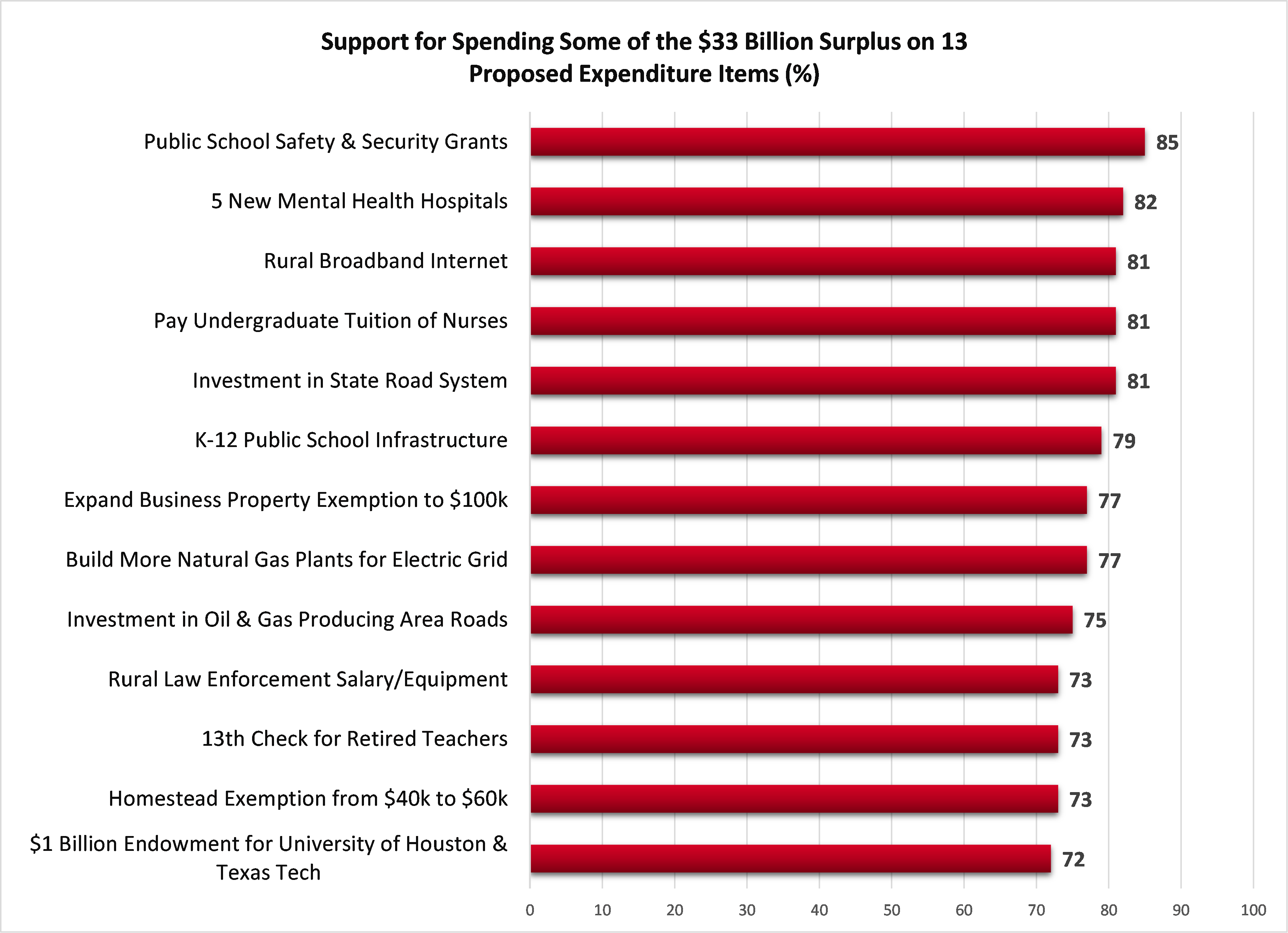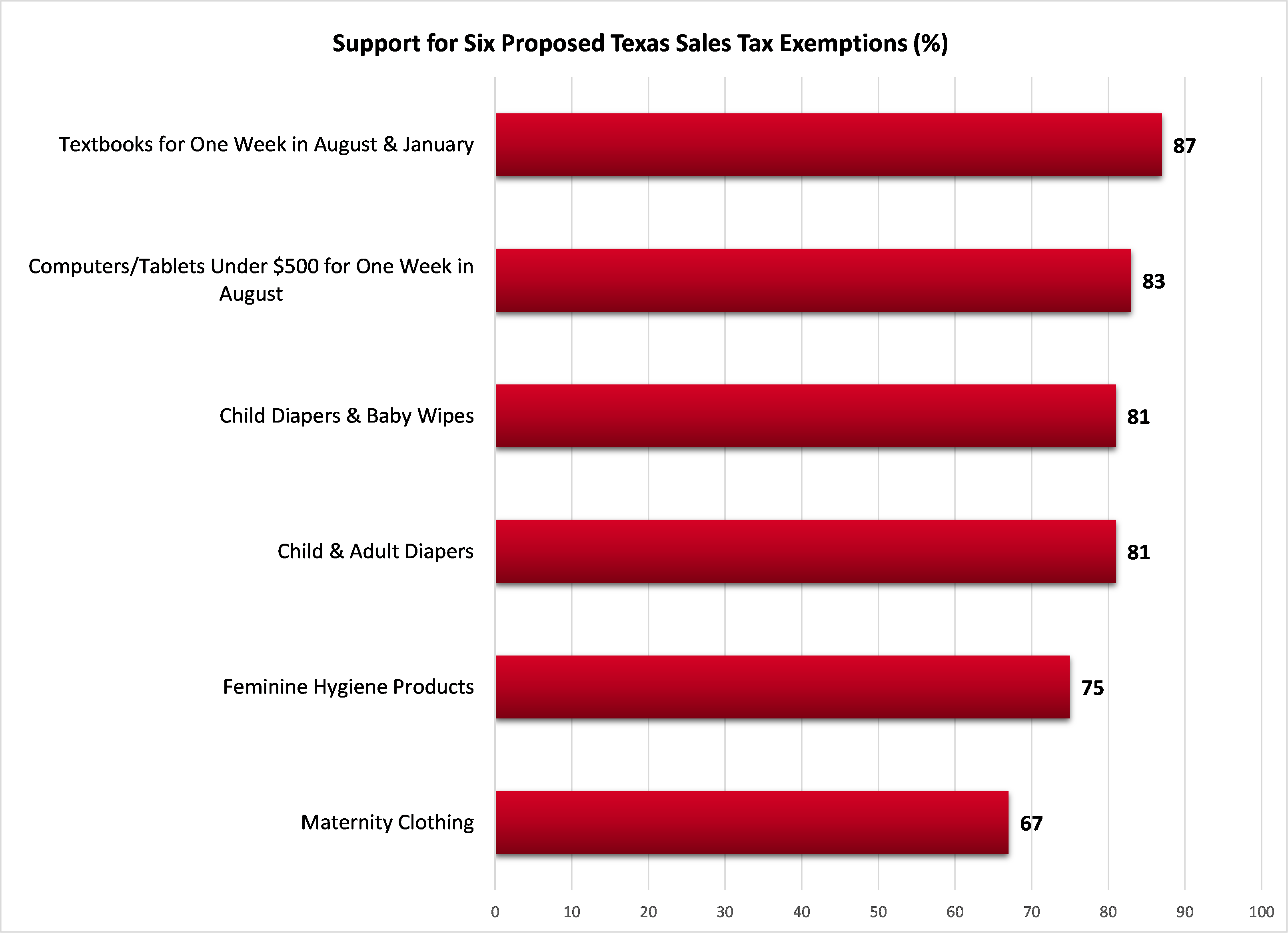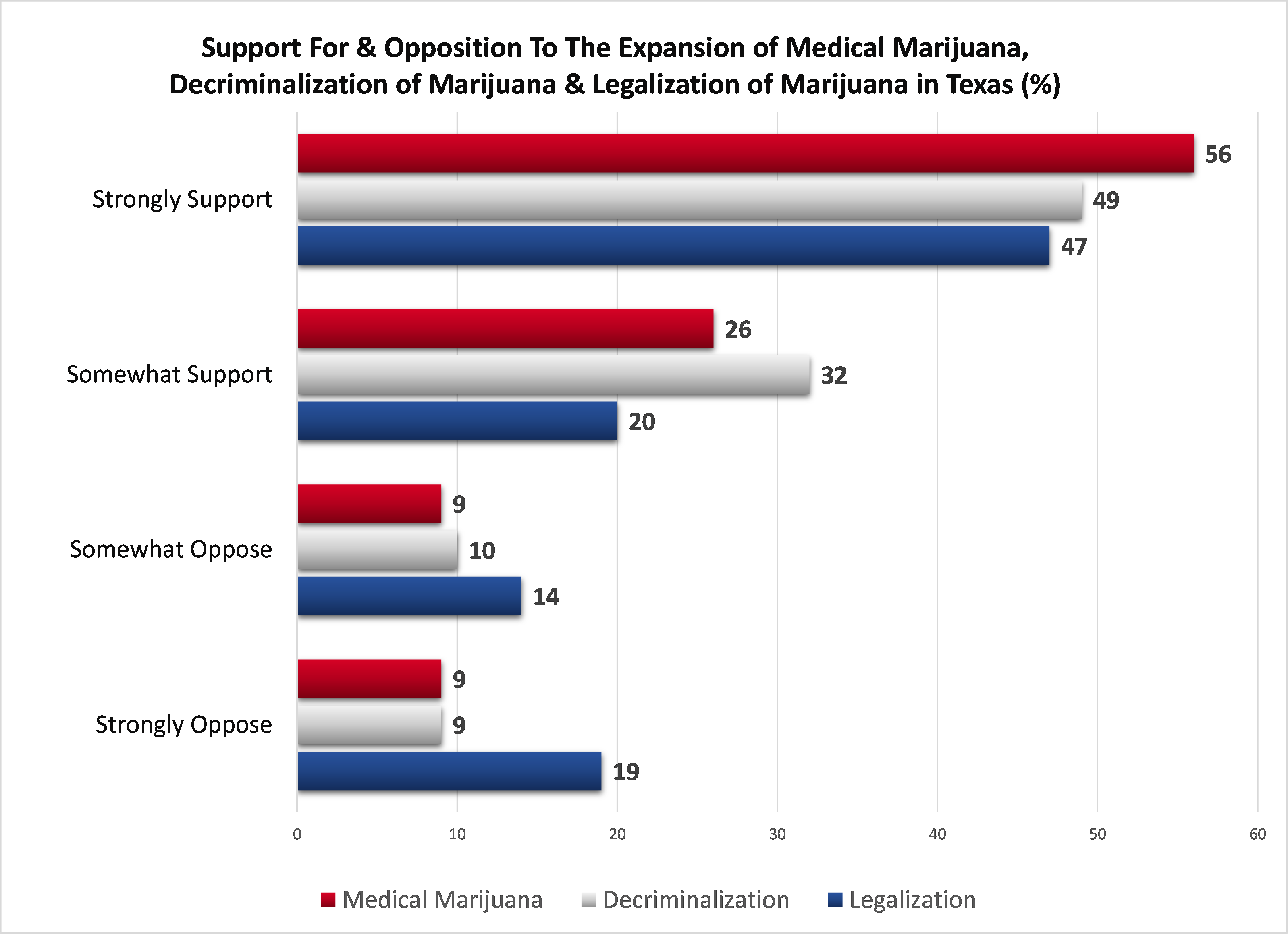Texas Legislative Issues 2023
With an unprecedented $33 billion budget surplus, Texas legislators have many decisions ahead. How much of the surplus should be spent and on what projects? Does the public support saving a considerable amount of the windfall? And what do Texans think about pressing policy issues such as education, abortion and energy? Will 2023 be the year that voters determine whether casino gambling is allowed in the Lone Star State? In a time of political polarization, are there any areas of partisan agreement? To answer these questions and more, the Hobby School of Public Affairs conducted a survey between Jan. 9 and Jan.19, 2023, in English and Spanish, with 1,200 adult Texans, resulting in a confidence interval of +/-2.8%. The respondents were matched to a sampling frame on gender, age, race/ethnicity, and education and are representative of the adult population in Texas.
The results of this survey will be presented in seven separate reports regarding the state budget surplus, casino gambling, school choice, and issues such as marijuana, abortion, firearms, elections, immigration and energy.
Report One. State Budget Surplus
Saving: The median Texan believes that between $10 and $14 billion of the record-breaking budget surplus should be saved (27% align with this position), with 38% of Texans favoring saving less (20% at $5 to $9 billion and 18% at $0 to $4 billion) and 35% favoring saving more (19% at $15 to $19 billion, 8% at $20 to $24 billion, and 8% at $25 to $33 billion).
Spending: When presented with 13 different expenditure items, all items enjoy substantial support, with public school safety and security grants garnering the highest level of support at 85%.

Veterans: 84% of Texans support legislation that would reimburse Texas public colleges and universities for at least 50% of the cost of providing veterans and their dependents with tuition benefits under legislation that has been passed by the Texas Legislature.
Postpartum Medicaid Coverage: 75% of Texans support legislation that would expand postpartum Medicaid coverage in Texas from 6 months to 12 months.
Sales Tax Exemptions: Considerable majorities of Texans support legislation that, if passed, would provide Texas sales tax exemptions for different products, with support ranging from 87% to 67%.

Read Report One to learn more about where Texans stand on these proposed budget items, including differences of opinion when considering gender, age, race/ethnicity and partisanship.
Media Release Jan. 24, 2023
Report Two. Gambling
Texas Senate Joint Resolution 17 (SJR 17), if passed by the Legislature, would require approval by a majority of voters in a November constitutional referendum. It would allow one casino resort in each of the state’s four major metro areas – Houston, Austin, Dallas-Fort Worth and San Antonio – along with limited casino gambling at horse and greyhound racetracks and legalized sports betting. It also would allow the state’s three recognized tribal communities to operate slot machines or casino gambling.
Support for SJR 17 is widespread across demographic and partisan lines in the Lone Star State:
- 75% of Texans support the passage of SJR 17, including 41% strongly supporting it.
- Partisan support ranges from 80% of Democrats to 74% of Independents and 72% of Republicans.
- Support spans the state’s sprawling geography: 75% of urban Texans, 74% of rural Texans and 66% of suburban residents support passage.
In addition, 69% of Texans support separate legislation that would only legalize online and in-person sports betting in the state.
Read Report Two to learn more about where Texans stand on an expansion of gambling in the state, including differences of opinion when considering gender, age, race/ethnicity, educational attainment, religion, region and partisanship.
Media Release Jan. 26, 2023
Report Three. School Choice
This report examines support for two forms of proposed school choice legislation: vouchers and tax incentives for donations to support attendance at private schools. It also looks at the role that independent school districts play in their communities.
Highlights
- 61% of Texans support and 39% oppose a policy which would provide low-income Texas parents with tax-funded vouchers that they can use to help pay for their children to attend private or religious schools of their choice.
- 53% of Texans support and 47% oppose a policy which would provide tax-funded vouchers for all parents in Texas, which they can use to help pay for their children to attend private or religious schools of their choice.
- 53% of Texans support and 47% oppose a policy which would provide low-income Texas parents in populous urban counties (1 million plus) with tax-funded vouchers that they can use to help pay for their children to attend private or religious schools of their choice.
- 65% of Texans support and 35% oppose the provision of state tax credits for individual and corporate donations to help low-income Texas parents send their children to private or religious schools.
- 61% of Texans support the provision of state tax credits for individual and corporate donations to help all Texas parents send their children to private or religious schools.
- 52% of Texans in rural counties, 43% in urban counties and 39% in suburban counties believe their ISD is very important to their local community’s identity.
- 46% of Texans in rural counties, 38% in urban counties and 35% in suburban counties believe their ISD is very important to their local community’s sense of togetherness.
- 44% of Texans in urban counties, 36% in rural counties and 34% in suburban counties believe their ISD is very important to their local community’s economic well-being.
- 45% of Texans in urban counties, 44% in rural counties and 39% in suburban counties believe their ISD is very important to their local community’s ability to attract and retain residents.
Read Report Three to learn more about where Texans stand on these proposed education items, including differences of opinion when considering gender, age, race/ethnicity, religion, educational attainment, income, children under 18 in the home and partisanship
Media Release Jan. 30, 2023
Report Four. Culture Wars
This report explores public opinion about various policy issues often considered part of the political culture wars.
Highlights
- 65% of Texans support legislation that would prohibit changing the sex on a minor’s birth certificate unless a clerical error had been made or the minor had atypical or ambiguous sex organs at birth.
- More than half (57%) of Texans support legislation that would classify as child abuse any gender-affirming care sought by parents from medical or mental health professionals.
- 62% support repealing the provision of the Texas Constitution that says marriage consists only of the union of one man and one woman.
- More than half of Texans (55%) support removing Confederate Heroes Day as an official state holiday.
- 67% support legislation that would require every Texas school district to offer ethnic studies, including Mexican American Studies or African American Studies, as part of the required curriculum.
- 69% support requiring parental approval for any sexuality instruction their children receive in public schools.
- 71% support requiring publishers selling books to Texas public schools to include a content rating similar to that used for movies.
Read Report Four to learn more about where Texans stand on these proposed legislative items, including differences of opinion when considering gender, age, race/ethnicity, religion, education and partisanship.
Media Release Feb. 1, 2023
Report Five. Marijuana
This report examines Texans’ opinions about specific proposed legislation regarding the easing of state restrictions on both the medical and recreational use of marijuana and personal views about the use of marijuana among adults. Additionally, the report discusses opinions about the impact of marijuana legalization on government revenue and the likelihood of its and other drug usage.
Highlights
- 82% of Texans support legislation that would make the use of marijuana legal for a wide range of medical purposes with a prescription, with 56% strongly in support of medical marijuana.
- 81% of Texans support legislation that would make the penalty for the possession of small amounts of marijuana a citation (similar to a traffic ticket), with 49% strongly in support of the decriminalization of marijuana.
- 67% of Texans support legislation that would make the recreational use of marijuana for any purpose legal for those age 21 and older, with 47% strongly in support of legalization.

- When asked about preferences regarding the sale and use of marijuana in Texas, 54% support legalization for medical and recreational use; 28% support legalization for medical use only; and 18% of Texans prefer the status quo under which marijuana use for either recreational or medical purposes is illegal in the state.
- 66% of Texans believe that the legalization of marijuana would be good for state and local government revenue, in contrast to 16% who believe it would be bad. 18% are of the position that the legalization of marijuana in Texas would not have an effect on state and local government revenue.
- 40% of Texans believe that the legalization of marijuana in Texas would increase the use of marijuana by those under the age of 21, compared to 15% who believe it would decrease underage marijuana use, and 45% who believe that legalization would not have an effect on underage marijuana use.
- 30% of Texans believe that the legalization of marijuana would make people more likely to use other illegal drugs, 30% believe legalization would make people less likely to use other illegal drugs, and 40% of Texans do not believe that legalization would have any effect on the likelihood of people using other illegal drugs.
Read Report Five to learn more about where Texans stand on these proposed legislative items, including differences of opinion when considering gender, age, race/ethnicity, religion, education and partisanship.
Media Release Feb. 2, 2023
Report Six. Abortion, Gun Safety, Immigration & Election Reform
This report examines support for legislation regarding abortion, gun safety, immigration, and election reform.
Highlights
Abortion
- 84% of Texans support legislation that would allow an abortion to take place in the event of a lethal fetal anomaly.
- 82% of Texans support legislation that would allow an abortion to take place if the mother’s physical health is at risk.
- 81% of Texans support legislation that would allow an abortion to take place if the pregnancy was the result of incest.
- 77% of Texans support legislation that would allow an abortion to take place if the pregnancy was the result of rape.
- 52% of Texans said they support making it easier to obtain an abortion.
- 33% of Texans said they support keeping Texas abortion policy the same as it is now.
- 15% of Texans said they support making it harder to obtain an abortion.
- 51% of Texans support legislation that would prohibit cities and counties from paying for travel by women out of state to obtain an abortion.
- 46% of Texans support legislation that would prevent businesses which receive tax incentives or benefits from providing funding to their employees to travel out of state to obtain an abortion.
Gun Safety
- 90% of Texans support legislation that would ban the possession or purchase of a gun by any individual with a restraining order filed against them for stalking or domestic violence.
- 86% of Texans support legislation that would require criminal background checks on all gun buyers, including those buying at gun shows and private sales.
- 85% of Texans support legislation that would create a 10 year minimum prison sentence if a firearm is used to commit a crime.
- 83% of Texans support legislation that would allow judges to take guns away from people shown to be a danger to themselves or others (red flag laws).
- 81% of Texans support legislation that would require a three-day mandatory waiting period between the purchase of a firearm and when a person can take possession of it.
- 80% of Texans support legislation that would raise the age to purchase an assault rifle (such as AR-15s) from 18 to 21.
- 76% of Texans support legislation that would raise the age to purchase any firearm from 18 to 21.
- 73% of Texans support legislation that would make it a crime to display a firearm while attending or within 500 feet of a public demonstration.
- 69% of Texans support legislation that would allow public institutions of higher education to ban the carry of handguns on their campuses.
- 63% of Texans support legislation that would ban the sale of high-capacity magazines.
Immigration
- Two-thirds (66%) of Texans support deploying the Texas National Guard to patrol the U.S.-Mexico border.
- 61% of Texans support spending $2 billion dollars a year on border security.
- 58% of Texans support the policy under which the state pays to send asylum seekers by bus to northern cities.
Election Reform
- 71% of Texans support making the penalty for the crime of illegal voting a felony.
- 71% of Texans support legislation that would allow all eligible Texans to register to vote online.
- 65% of Texans support legislation that would allow all Texans (rather than only those age 65 and older) to vote absentee (i.e., by mail) for any reason.
Read Report Six to learn more about where Texans stand on these proposed legislative items, including differences of opinion when considering gender, age, race/ethnicity, religion, education and partisanship.
Report Seven. Energy
This report examines preferences regarding energy sources in the United States, support for using state funds to provide incentives for the construction of natural gas power plants, support for home solar power related legislation, and interest in installing solar panels and an energy storage system among homeowners.
Highlights
- Nearly two-thirds (64%) of Texans favor expanding U.S. reliance on solar power plants as an energy source while 12% favor its reduction.
- 57% of Texans favor expanding U.S. reliance on wind turbine farms as an energy source while 19% favor its reduction.
- 41% of Texans favor expanding U.S. reliance on onshore conventional oil and natural gas as an energy source while 31% favor its reduction.
- 40% of Texans favor expanding U.S. reliance on offshore conventional oil and gas as an energy source while 33% favor its reduction.
- 35% of Texans favor expanding U.S. reliance on fracking for oil and natural gas as an energy source while 42% favor its reduction.
- 42% of Texans favor expanding U.S. reliance on natural gas fired power plants as an energy source while 28% favor its reduction.
- 27% of Texans favor expanding U.S. reliance on coal mining and coal fired power plants as an energy source while 47% favor its reduction.
- 42% of Texans favor expanding U.S. reliance on nuclear power plants as an energy source while 29% favor its reduction.
- 59% of Texans favor expanding U.S. reliance on geothermal power plants as an energy source while 14% favor its reduction.
- 57% of Texans favor expanding U.S. reliance on hydroelectric dams as an energy source while 12% favor its reduction.
- 54% of Texans favor expanding U.S. reliance on hydrogen power plants as an energy source while 17% favor its reduction.
- 42% of Texans favor expanding U.S. reliance on ethanol and other biofuels as an energy source while 27% favor its reduction.
- Between January 2021 (before Winter Storm Uri) and January 2023, the proportion of Texans favoring the expansion of four energy sources increased significantly: ethanol and biofuels (increase of 11%), offshore conventional oil and natural gas (increase of 10%), fracking for oil and natural gas (increase of 8%), and coal mining and coal fired power plants (increase of 8%).
- More than three-quarters (77%) of Texans favor using some of the state’s budget surplus to provide one-time tax credits or incentives to companies to promote the immediate construction of more natural gas power plants to increase the reliability of the electrical grid.
- 90% of Texans support legislation that would allow homes and businesses with solar panels to sell any extra power they generate back to the electric grid for the same price that the utility charges consumers to buy the electricity (i.e., net-metering).
- 82% of Texans support legislation that would offer financial incentives (such as tax breaks or rebates) for individual homeowners and businesses to install rooftop solar panels and battery storage.
- 33% of Texas homeowners are very interested and 31% are somewhat interested in purchasing a solar energy system, compared to 16% who are not too interested and 20% who are not at all interested.
- Since Winter Storm Uri hit Texas in February 2021, 44% of Texans have become more interested in purchasing a solar energy and energy storage system (e.g., rooftop solar panels and battery storage) while 8% have become less interested and 48% maintain the same level of interest they had two years ago.
Read Report Seven to learn more about where Texans stand on these proposed legislative items, including differences of opinion when considering gender, age, race/ethnicity, education and partisanship.
Media Release Feb. 15, 2023
Research Team
Renée Cross, Senior Executive Director & Researcher, Hobby School of Public Affairs
Mark P. Jones, James A. Baker III Institute for Public Policy's Fellow in Political Science, Rice University; Senior Research Fellow, Hobby School of Public Affairs
Maria P. Perez Argüelles, Research Associate, Hobby School of Public Affairs
Savannah Sipole, Research Associate, Hobby School of Public Affairs
Agustín Vallejo, Post-Doctoral Fellow, Hobby School of Public Affairs